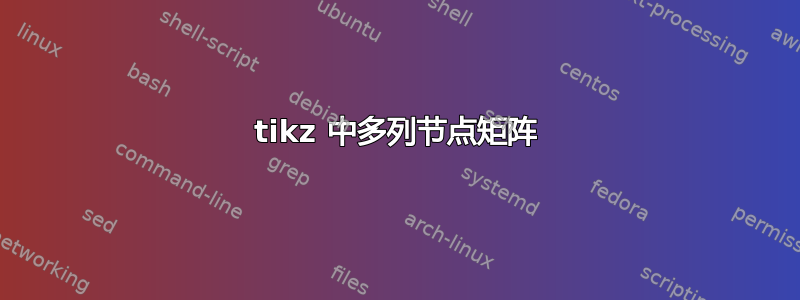
我想用 tikz 创建一个图表,其中条目会覆盖多列。我已经使用 fit 包解决了这个问题。但现在矩阵中的节点外观存在问题。多列矩形中的文本未居中。我该如何解决这个问题?
\documentclass[
a4paper,
12pt,
headings=normal, % small
]{scrartcl}
\usepackage{tikz}
\usetikzlibrary{positioning,arrows,chains,matrix,scopes,fit}
\begin{docoument}
\begin{tikzpicture}
\tikzset{element/.style={rectangle,
inner sep=0pt,
minimum width=15mm,
very thick,
draw = black,
top color=blue!20!white!20, bottom color=blue!70!white,
font=\tiny,
}}
\tikzset{element2/.style={rectangle,
minimum size=5mm,
very thick,
draw = black,
top color=blue!20!white!20, bottom color=blue!70!white,
font=\tiny
}}
\tikzset{point/.style={circle,
inner sep=0pt,
minimum size=2pt,
fill=red
}}
\matrix (table) [%
matrix of nodes,
nodes in empty cells,
row sep=4mm,column sep=5mm,
nodes={text centered}
] {%
\node(p1)[point]{}; & & \node(p2)[point]{}; & & & \node(p3)[point]{}; & & & \\
& & & & & & & &\\
& & & & & & \node()[element2]{$+1$}; & & \\
& & & \node(p4)[point]{}; & & & & & \node(p5)[point]{}; \\
& & & & & & & & \\
\node(p6)[point]{}; & & & \node(p7)[point]{}; & & & & & \\
& \node(p8)[point]{}; & & & & & \node(p9)[point]{}; & & \\
& & & & & & & & \\
\node(p10)[point]{}; & & & & & & & & \\
};
\node[fit=(table-2-2)(table-2-4),element]{label1};
\node[fit=(table-2-7)(table-2-9),element]{label2};
\node[fit=(table-5-2)(table-5-3),element]{label3};
\node[fit=(table-5-6)(table-5-7),element]{label4};
\node[fit=(table-7-4)(table-7-5),element]{label5};
\node[fit=(table-8-4)(table-8-5),element]{label6};
\end{tikzpicture}
\end{docoument}
答案1
fit该库会进行一些额外的测量来覆盖给定的坐标,显然它不尊重锚点的位置,base因此最好为拟合节点添加标签。Claudio 的评论是一种选择,但如果拟合节点跨越更多行,它可能会失效。
另外,在matrix of nodes设置中您不需要提供额外的节点声明。
\documentclass[
a4paper,
12pt,
headings=normal, % small
]{scrartcl}
\usepackage{tikz}
\usetikzlibrary{positioning,arrows,chains,matrix,scopes,fit}
\begin{document}
\begin{tikzpicture}
\tikzset{element/.style={rectangle,
inner sep=0pt,
minimum width=15mm,
very thick,
draw = black,
top color=blue!20!white!20, bottom color=blue!70!white,
}}
\tikzset{element2/.style={rectangle,
minimum size=5mm,
very thick,
draw = black,
top color=blue!20!white!20, bottom color=blue!70!white,
font=\tiny
}}
\tikzset{point/.style={circle,
inner sep=0pt,
minimum size=2pt,
fill=red
}}
\matrix (table) [%
matrix of nodes,
nodes in empty cells,
row sep=4mm,column sep=5mm,
nodes={text centered}
] {%
|[point]| & & |[point]| & & & |[point]| & & & \\
& & & & & & & &\\
& & & & & & |[element2]|$+1$ & & \\
& & & |[point]| & & & & & |[point]| \\
& & & & & & & & \\
|[point]| & & & |[point]| & & & & & \\
& |[point]|& & & & & |[point]| & & \\
& & & & & & & & \\
|[point]| & & & & & & & & \\
};
\node[fit=(table-2-2)(table-2-4),element,label={[font=\tiny]center:label1}]{};
\node[fit=(table-2-7)(table-2-9),element,label={[font=\tiny]center:label2}]{};
\node[fit=(table-5-2)(table-5-3),element,label={[font=\tiny]center:label3}]{};
\node[fit=(table-5-6)(table-5-7),element,label={[font=\tiny]center:label4}]{};
\node[fit=(table-7-4)(table-7-5),element,label={[font=\tiny]center:label5}]{};
\node[fit=(table-8-4)(table-8-5),element,label={[font=\tiny]center:label6}]{};
\end{tikzpicture}
\end{document}



